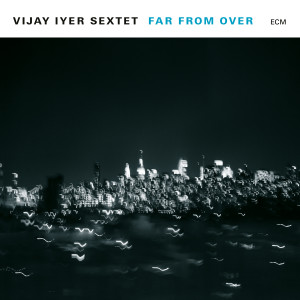 In the middle of the most turbulent year in America since 1968, the Vijay Iyer Sextet steps forth with an hour of jazz that roars and soars and sings with defiance and joy. Iyer in the liner notes makes clear the focus of this music: “As the arc of history lurches forward and backward, the fact remains: local and global struggles for equality, justice, and basic human rights are far from over.”
In the middle of the most turbulent year in America since 1968, the Vijay Iyer Sextet steps forth with an hour of jazz that roars and soars and sings with defiance and joy. Iyer in the liner notes makes clear the focus of this music: “As the arc of history lurches forward and backward, the fact remains: local and global struggles for equality, justice, and basic human rights are far from over.”
Iyer with Far From Over continues to set the bar high for his fellow musicians. His most recent trio release Break Stuff was one of the top jazz recordings of 2015, but it was a bit austere and cerebral. Far From Over is anything but. Intense, driving, exuberant, this is music to engage body, soul and spirit.
The sextet in various configurations has been together since 2011. It consists of Iyer on piano and Fender Rhodes, with his longtime bassist Stephan Crump and Tyshawn Sorey, an alternate trio member on drums, plus the horn section: Steve Lehman on alto saxophone, Mark Shim on tenor and Graham Haynes on cornet, flugelhorn and electronics. Tyshawn Sorey is a monster of rhythm and consistently the key member of this ensemble, driving everything forward with absolutely unstoppable intensity. It’s everywhere, but a good example is the combination of subtly shimmering cymbal work and in-your-face thunderous toms on the brief, electronica-inflused “End Of The Tunnel.” Lately I’ve been rather obsessively listening to fusion-era Miles Davis recordings, and this is definitely in that wheelhouse.
I haven’t heard a lot of music from Vijay Iyer that makes me want to dance along, but “Nope” does. It’s five-and-a-half minutes of sensuous, joyful, funky soul-jazz. Except for a Monk-esque middle section on piano, Iyer mostly plays a crystaline countermelody on the Fender, laying a tinkling wave of serenity over the juddering rhythm and stabbing horns of the tenor and alto that are at times tangling like competitive siblings while Haynes’s disembodied coronet soars above.
The mood is supple here, the sextet moving easily from the elegiac moods that infuse a couple of tracks: “Wake” with its shofar-like horns and haunting electronics, and “For Amiri Baraka,” with its dark-blue tones that hint at the danger and controversy courted by the late writer in his poetry, drama and prose; to the sharp, crisp pointilism of “Into Action”; to the urgent post-bop of “Down To The Wire” with a tour-de-force solo from Shim on tenor and laser-focused intensity from the rhythm section of Sorey and Crump; to the intense opener “Poles” on which Shim takes you to school with a roaring tenor solo followed by a cooling passage that pairs Iyer’s Fender and Haynes’s flugelhorn; to the cathartic closer “Threnody” and Lehman’s soaring alto solo.
But the centerpiece of this album, as it should be, is the title track, six minutes of focused, finely crafted jazz. The rhythm section lays down an almost impossibly complex bed, on which the horns and Iyer on piano take turns pushing each other to ever greater heights of improvisation. It harnesses chaos and makes it sing and dance, as if to say, “This is the beauty that is not only possible but inevitable when we come together and face down the darkness.”
If it sounds as though I’m writing this in the midst of a weekend in which people were attacked and gave their lives for standing up to oppression in #Charlottesville, you’re right. Although it was recorded months ago, the timing of this release couldn’t be better.
“Defiance and unity, somehow together – that’s the sound this band captures to me,” Iyer says in the promotional material for *Far From Over*. “Joy and danger – that spectrum of possibilities is in there, too. There’s real exuberance in the playing, though a lot of the music is fiendishly difficult to play. Sometimes we don’t know how we’re going to make it, which puts us in this vulnerable space. But that vulnerability enables us to access emotion and bring that into the music. It’s not about showing off a certain prowess or being ‘angry.’ It’s about being vulnerable – that has to be in the music. When I hear that in somebody else, I feel like it’s inviting me in. When you reveal something of yourself in the course of making music, it brings the listener right up close to you. It can make them feel involved in the music, so that it’s a shared experience. And that’s the idea.”
That kind of music is balm and motivation and inspiration, it’s everything that jazz music has held the potential for since its beginnings a century ago. I can’t say if it is timeless music, but Far From Over is essential music for this moment in the 21st century.
(ECM, 2017)
